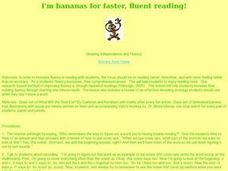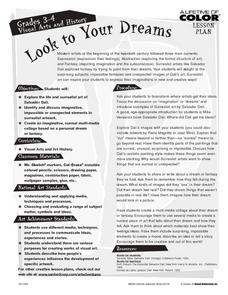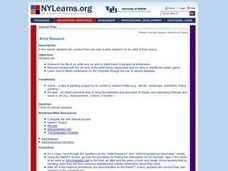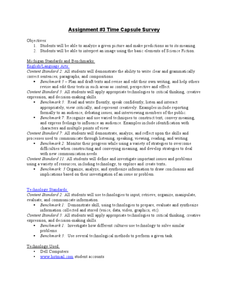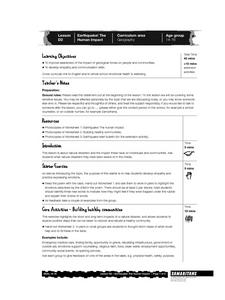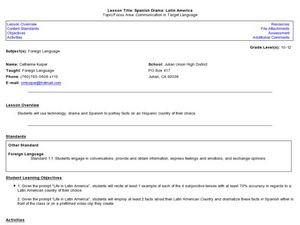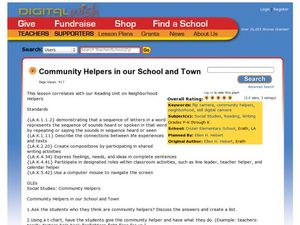Curated OER
What Can We Do Today?
Learners practice rereading selected passages to improve their reading fluency. Working in pairs, students read and reread decodable, leveled passages fluently and with expression. They are assessed by their partner, using a fluency...
Curated OER
Anger (Part 1): Identifying Our Style
Students identify the two common sources of anger. In this psychology lesson, students discuss productive ways to express anger. They complete a reflection worksheet at the end of the lesson.
Curated OER
ESL Activities: Our Paths to Australia - 15 September 2004
Students identify their own feelings about coming to a new country. Students understand vocabulary associated with emotions. Students recognise that their emotions are not unusual amongst people with similar experiences .
Curated OER
Individual Rights -- Freedom of Speech at School
Students examine their individual rights at a public school. In groups, they identify the most common ways of expressing themselves and why they should limit their speech in public. They compare and contrast two cases in which they...
Curated OER
Using Shanties to Create Lyrics
Students demonstrate an understanding of shanties, a traditional music form. They listen to several shanties and create their own verses to add on to these songs. They express their feelings through music by using rhythm and rhyme to...
Curated OER
Understanding Korean Culture
Third graders investigate the meaning of immigration by looking it up in the dictionary and discussing it. They determine the location of Korea on the map and brainstorm ideas about it. They listen to a read aloud of Helen Recorvits, My...
Curated OER
Look Again: Revising
Fifth graders read "Jabberwocky," as an example of revision. They practice revising their own work.
Curated OER
Introduction to Poetry
Students determine the rhyme scheme of a poem and find examples of similes. In this poetry analysis lesson, students review definitions needed for the topic and analyze the rhyme or rhythm for the example poems. Students also find...
Curated OER
Winter Holiday Attitude Adjustment
Students create kind sentences or compliments for each classmate in this feel-good instructional activity ideal for a Language Arts classroom just before Winter break. The instructional activity includes examples of positive comments...
Curated OER
Unconditional Kindness
Learners express their feelings about their neighbors and how to be kind to others. Teacher and students discuss the meaning of philanthropy and how they can be kind to others. After reading a particular trade book, learners are assessed...
Curated OER
Art And the Individual: Richard Billingham
Students examine the work of photographer Richard Billingham. They discuss why people produce art, the service it provides in society and how negative and mundance instances and feelings can also inspire artistic expression.
Curated OER
The Right to Vote
Students are provided a form for learner to read and discuss several ways people have been prevented from voting. Students relate what they know and discovered about voting rights for different population of people. They establish a...
Curated OER
I'm Bananas for Faster, Fluent Reading!
Learners review the way to use cover-ups to focus on vowels and decoding. They listen as the teacher demonstrates reading a sentence slowly like a robot, and then a little faster each time, adding feeling and expression. They then read a...
Curated OER
Tree of Giving
Students work together as a team to solve the hypothetical common problem of litter. They give examples of organizations that focus on trying to help others in significant ways (volunteers). Each group maps out their strategy, a tree...
Curated OER
Non-verbal Cues
Students distinguish between verbal and nonverbal communication. In this communication series activity, students identify the emotions portrayed by photos shown. They role play examples of good and bad listening skills.
Curated OER
Look to Your Dreams
Students research the life of surrealist artist Salvador Dali and create their own "surreal" art in the form of a collage, based upon their dreams or fantasies.
Curated OER
Artist Research
Students research an artist of their choice on the internet. They are provided with questions (worksheets included with the lesson) as a guide for their research. Students choose an artwork by their artist to critique.
Curated OER
Time Capsule Survey
Here's a fun way to incorporate technology into your curriculum. E-mail each of your class members a picture and 10 questions about the photo. Individuals then imagine the story behind the image and e-mail back their responses. Although...
Curated OER
Earthquake! The Human Impact
Students explore the impact of natural disasters on communities. In this character education lesson, students examine poetry regarding an earthquake. Students discuss how to rebuild communities in the wake of natural...
Curated OER
Storytelling in the Classroom
What makes story telling special? Young readers demonstrate how to tell a story to others. Kindergarteners, first graders, and second graders read biographies of "Building Blocks" characters and tell a story about a character to their...
Curated OER
Spanish Drama: Latin America
Learners explore Hispanic countries. In this Hispanic culture and language lesson, students choose an Hispanic country to research. Learners explore given websites and prepare a dramatization incorporating the facts they...
Curated OER
The Preterite vs. the Imperfect
Students write their own original studenT story in the past in Spanish using the imperfect and the preterite after watching the teacher present the provided Power Point presentation on the differences in the uses of the two.
Curated OER
Community Helpers in our School and Town
Students create a PowerPoint presentation. In this community helpers lesson, students discuss community helpers and create a t-chart to list what each community helper does. Students watch a PowerPoint presentation, walk through the...
Curated OER
Persuasive Writing
Fourth and fifth graders try their hand at persuasive writing. They listen to well-written persuasive articles so they can get a sense of what good persuasive writing is. Then, they brainstorm topics they'd like to write about and are...












